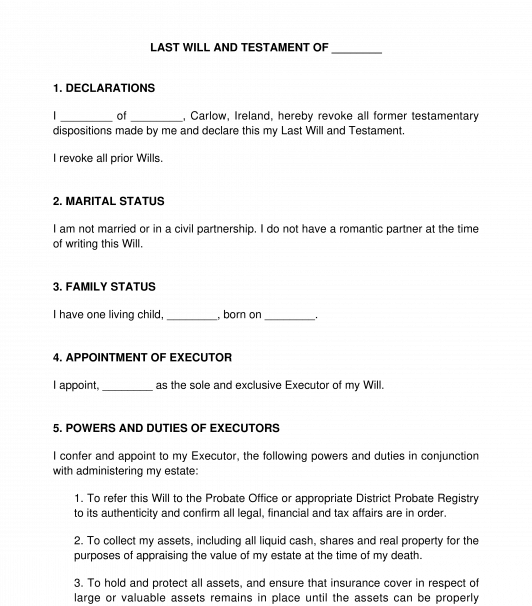 23/11/2025
23/11/2025

Answer a few questions and your document is created automatically.

Your document is ready! You will receive it in Word and PDF formats. You will be able to modify it.

 23/11/2025
23/11/2025
 Word and PDF
Word and PDF
 3 to 4 pages
3 to 4 pages
It is very important that anyone with any kind of estate write a Will to express how they would like their estate to be divided. Without clearly identifying who should get what, the deceased's assets will be distributed automatically according to the laws of intestacy, which may contradict with the deceased's intentions when they were alive.
A Will is a set of instructions prescribing how to deal with a deceased person's estate (all of their assets) upon their death. The individual writing the Will is known as the 'Testator'.
This document allows individuals to clearly list their main assets and identify the beneficiaries to whom they would like to receive them. The Will outlines how the deceased's assets are to be distributed, a Will often contains important legal information such as provisions for guardianship of underage children and guidance on the deceased's preferences for their funeral and disposition of their remains.
In order to write a valid Will, the Testator must be over the age of eighteen, be of sound mind and be acting without any undue influence.
The Testator must appoint an 'executor' to administer their estate, according to the instructions contained in the Will.
It is the responsibility of the executor to collect all of the testator's assets, and after paying off existing debts and funeral expenses, distribute them as prescribed in the Will to the named beneficiaries.
The executor is typically the Testator's spouse or close relative. The executor can simultaneously be a beneficiary, i.e. they can benefit from a gift bequeathed under the Will. Given the often heavy administrative workload involved in managing the disposition of the Testator's estate, the Testator should be sure to nominate someone in relatively good health of good mental capacity to assume this role.
Parties receiving gifts or assets under the Will are known as 'beneficiaries'.
Beneficiaries can be individuals or legal entities (typically charities or companies limited by guarantee). Beneficiaries can be any age, but beneficiaries under the age of 18 will have their assets held in a trust until they reach the age of 18.
Trusts seem like a complex legal mechanism. In reality, all it means is that gifts bequeathed under a Will are vested in a named individual (a trustee) to be held for the minor beneficiary until the child reaches the age of 18. The Testator can nominate trustees in this document. If no trustee is nominated, then upon the Testator's death their personal legal representative will appoint a trustee themselves in whom to vest any gifts earmarked for minor beneficiaries. The trusts employed in this document are very simple. The trustee need only hold the assets until the child is 18 or in some cases invest the money for the child's benefit. To establish a more complex trust governing by several terms and conditions (for education or housing etc), a solicitor should be consulted.
Ideally, the Testator themselves should write their own Will. In any event, the Testator should NOT be directly consulted when filling out the Will template. The Testator should compile a list of all their assets and carefully reflect on how they would like them to be distributed among their loved ones.
It is very important that the signature of the Will be witnessed to assure the Testator is acting freely and within their full capacities. The witness cannot be a beneficiary or the executor in the Will. In circumstances where a person who witnesses the execution of a Will also stands to benefit under the Will then the devise, bequest, estate, interest, gift or appointment shall be "utterly null and void". The witness must be at least 18 years of age, and not suffering from any physical or mental incapacity that would infringe on their sound judgement. Often, a solicitor or notary is engaged to act as the witness.
The witness's function is to affirm that the contents of the Will do in fact represent the true intentions of the Testator, that the instruction in the Will express the Testator's genuine wishes for the dissolution of their estate. In the event the Will is disputed, the witnesses will be required to swear an affidavit to that effect.
This Last Will and Testament is written according to the common law of Ireland and the Trustees Act 1893, the Trustees (Authorised Investments) Act 1958, and Succession Act of 1965.
You fill out a form. The document is created before your eyes as you respond to the questions.
At the end, you receive it in Word and PDF formats. You can modify it and reuse it.
Last Will and Testament - sample template
Country: Ireland